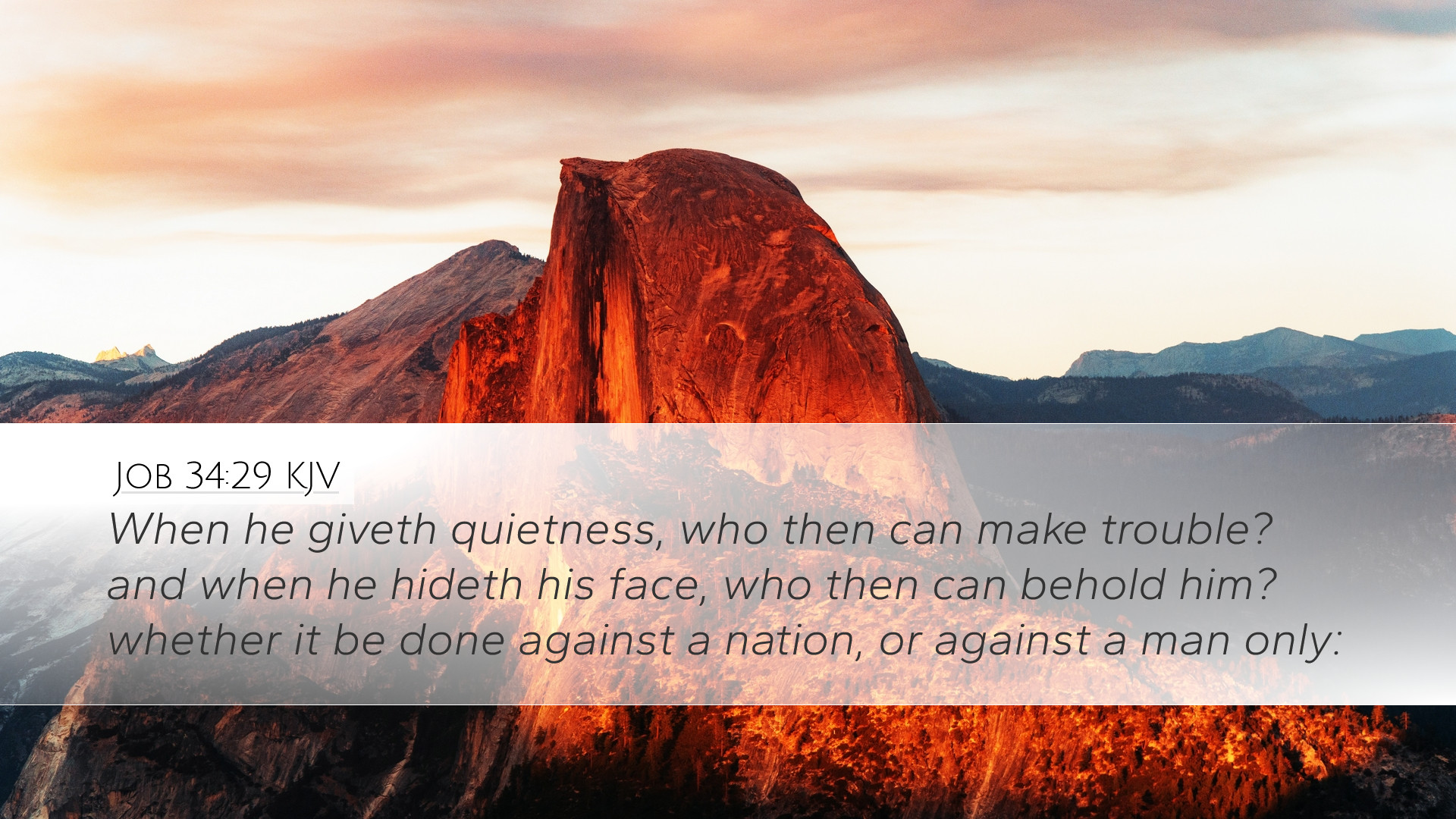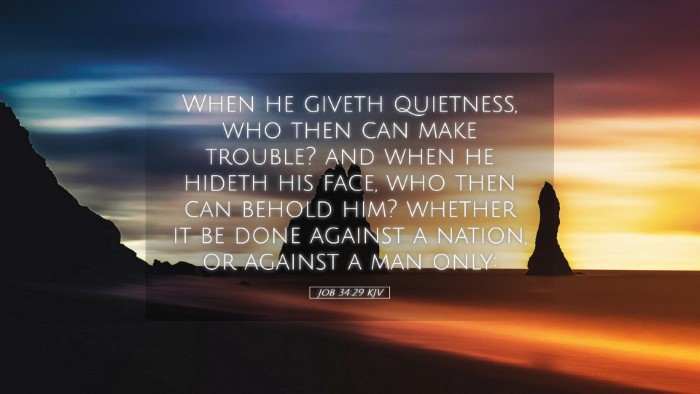Commentary on Job 34:29
Job 34:29 states, "When he gives quietness, who then can make trouble? And when he hides his face, who then can see him, whether it be done against a nation, or against a man only." This profound verse encapsulates the sovereignty of God and the futility of human unrest against divine will. Various public domain commentaries provide deep insights into its meaning, particularly from Matthew Henry, Albert Barnes, and Adam Clarke.
General Themes of the Verse
- Divine Sovereignty: This verse emphasizes that God is ultimately in control. His authority is unassailable; when He chooses to grant peace or obscurity, no one can dispute His decision.
- The Nature of God's Presence: The text reveals that God's presence can bring peace or silence, suggesting that His hiddenness can yield situations both nationally and personally, affecting communities and individuals alike.
- The Human Condition: The verse encourages reflection on human limitations. It implies that the distress and troubles experienced may, at times, stem from a failure to recognize God's omnipotence and His ways of operating.
Insights from Matthew Henry
Matthew Henry notes that this verse calls attention to God's profound ability to render peace amidst chaos. He emphasizes that when God brings tranquility, even the most tumultuous circumstances cannot prevail. Henry highlights that God's intention in granting quietness is significant, serving as a reminder of His ultimate plan and benevolent governance. He asserts that recognizing God’s face hidden is tantamount to acknowledging the divine will in situations of both distress and comfort.
Insights from Albert Barnes
Albert Barnes elaborates on the implications of the statement that when God 'hides His face', it conveys the idea of divine withdrawal, where it appears God is not active in human affairs. Barnes stresses that the absence of God's favor can lead to distress and disarray. He also posits that the verse is a form of didactic teaching aimed at emphasizing the inescapable authority of God over all creation. Barnes warns believers to remain steadfast in faith during periods of perceived divine silence, reinforcing that such moments do not negate God’s presence or control.
Insights from Adam Clarke
Adam Clarke approaches the verse from a philosophical and theological standpoint, interpreting the quietness granted by God as a state of grace. Clarke suggests that such quietude is not merely the absence of trouble but a deep, abiding peace imparted by the Divine. He further argues that when God turns His face away, there can be consequences on both individual and national levels. Clarke's reflection emphasizes the need to understand both the peace that God offers and the implications of His withdraw, advocating for a life of faith even amidst the silence of God.
Theological Implications
- The Assurance of God's Sovereignty: The verse reinforces the importance of relying on God's governance, especially in tribulations, which is a recurring theme in both historical and contemporary theological discourse.
- Understanding Divine Quietness: It invites a deeper exploration into what it means for God to grant peace and how this tranquility manifests in the lives of believers. Living in recognition of this quietness can transform personal and communal worship.
- Faith in Silence: The apparent absence of divine intervention prompts an examination of faith dynamics—understanding that silence does not equate to absence. Pastorally, this offers an opportunity for support and encouragement to those struggling with perceived divine obscurity.
Practical Applications for Believers
In light of Job 34:29, believers are encouraged to:
- Seek Peace in God: Engage in practices that promote quietness in the soul, through prayer and meditation on God’s Word, fostering a deep connection with God’s peace.
- Cultivate Patience: During times of trouble, remain patient and hopeful, trusting that God remains sovereign and is working both personally and globally.
- Develop a Theological Framework: Reflect on the nature of God's hiddenness and how it applies in ministry, counseling, and personal faith journeys, promoting a robust understanding of God’s ways.
Conclusion
The exploration of Job 34:29 through the lenses of esteemed commentators like Matthew Henry, Albert Barnes, and Adam Clarke reveals the multifaceted nature of God's sovereignty and the significance of His peace. For pastors, students, and theologians alike, this verse reminds us of the profound truth that God is in control, that His peace surpasses all understanding, and that, even when hidden, His presence is integral to our understanding of faith and resilience in troublesome times.


